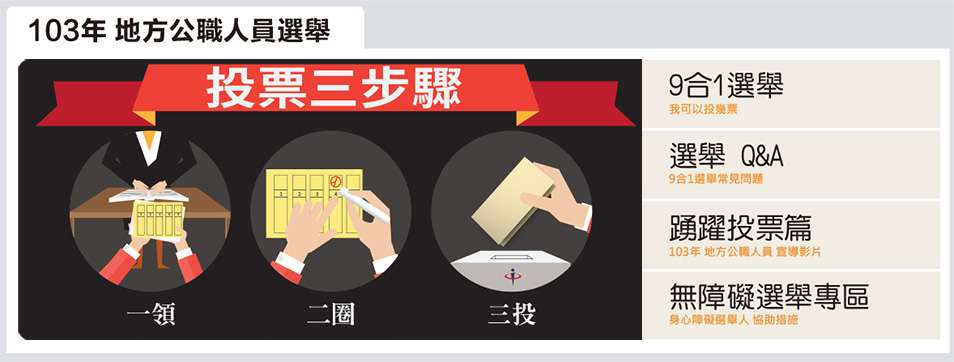Taiwan's local elections will be held on November 29, 2014 in which 11,130 public servants, including city mayors, city councilors and village chiefs will be chosen from 19,762 candidates. The outcome of the local elections will affect the result of the 2016 Taiwan legislative and presidential elections.
While the electoral system in Taiwan favors the two-party system in which the ruling party is mainly a competition between Kuomintang (KMT) and Democratic Progressive Party (DPP), this year a number of small political parties and individuals have decided to compete with the big parties in the upcoming local elections.
Among the new faces are young people who are not affiliated with any party, but who come from the Wild Strawberry Movement in 2008 and the Sunflower Movement in 2014, which led a three-week occupation of Taiwan's legislature earlier this year to protest a secretly negotiated trade deal with China. Many want to use of the occasion of elections to deliver their ideas about social justice to a wider audience and bring change to their hometowns if they win the position of village chief.
One of the young candidates, Yoshi Liu, was involved in the 2008 Wild Strawberry Movement, a student movement that stood against the police abuse of power during mainland Chinese officials’ visit to Taiwan. He explained why he decided to run for the election in an interview with reporters from News E-forum, an independent citizen media run by students and activists:
回憶2008年野草莓運動,妖西看見「社會運動無法與學生生涯結合」,也看見了社運的侷限。他直言,社運青年常被政治潔癖或信條所困,無法有效結合握有權力者,最後人散掉了、也籌措不了更多資源。但政治卻可能帶來真正改變。
When Yoshi looked back on the Wild Strawberry Movement in 2008, he saw that “students were incapable of supporting a long-term social movement”. He also believed that the social movement had their limitations. However, most young activists tried to stay away from mainstream politics and refused to work with those who were in a position of power. Eventually, they [graduated and] left the movement, and it couldn't find enough resources for future mobilization. Election politics, however, can make real change.
News E-forum reporters interviewed a political scientist to explain why many young candidates are aiming for the village chief position:
「台灣的民主化果實,是樹上很漂亮的花,地方的根逐漸在腐爛。」談到台灣地方政治,台大政治系教授王業立直言,雖然中央政府已經歷二次政黨輪替,台灣民主素養看似提升,但地方民意代表至今幾乎其實都是地方派系掌控,甚至時常與「黑金」劃上等號。
台灣地方政治猶如一個小生態系,而當選與否高度仰賴人際網絡,因此,與地方連結度強的里長便成為關鍵角色:「樁腳」。
談到青年參政如何撼動或改變現有結構,比起哪一個「個人」能夠當選,真正的期許反而多落在「如何改變現有選舉文化」這個目標上。
“Democracy in Taiwan is the beautiful flowers hanging from the tree, but its roots based in the local communities are rotten.” When discussing local politics in Taiwan, Professor Wang Yeh-Lih at the National Taiwan University's Department of Political Science said that although the island has gone through the rotation of ruling parties and society has developed a political culture in the practice of democracy, at the local level councilors and village chiefs are still controlled by local factions, which are often connected to gangs and plutocrats.
Local politics in Taiwan is like a small ecosystem. The chances of winning a position are highly related to a person's social network. As a result, the village chiefs, who are well connected in their communities, are playing the role of “vote brokers” in upper-level elections.
Regarding how young candidates can change the present system, he believed that the emphasis should be put on the goal of “how to change the existing culture of election” instead of on which individual wins the vote.
With few resources, it would be indeed difficult for young candidates to win any elections. Coolloud.org, an independent media outlet focused on social movement news, explained why the electoral system in Taiwan does not favor newcomers without financial resources:
依縣市級別和參選項目之不同,每位參選人需籌措12萬~200萬不等,對於資源龐大且還可獲國家補助的大黨來說,保證金有如一碟小菜無足掛齒,但對於小黨及一般參選人來說,保證金是首先要面對的挑戰,不少綠黨參選人雖已準備好跨越這道門檻,但隨著保證金繳進國庫,從擬參選人正式加入選戰的綠黨「候選人」們,又要面對競選基金歸零的另一道難關。
除了設定的保證金門檻,接下來從競選團隊、買廣告一路下來有如一場精彩的財力遊戲
目前的選舉機制,是以財力來評量可否參選甚至當選。
Individual candidates need to pay 120,000 to 2,000,000 New Taiwan dollars [3,909 to 65,150 US dollars] for an election deposit, depending on the particular position and level of government he or she is running for. For big political parties, which can obtain resources from the government, the election deposit is a piece of cake. However, for small parties and individuals, it is their first challenge. Although many candidates in the Green Party have gathered enough money for the deposit, they have used up all their cash and will not have enough money for their election campaigns.
In addition to the deposit, the election campaigns and advertising are all part of the glamorous money game.
Our present electoral system evaluates whether a candidate can register or even win the election by their wealth.
In addition to the election deposit and campaign funding, the mobilization of voters is also a money game. For example, Taiwanese businessmen in China who support the current ruling Kuoming Tang provide discount flight tickets for Taiwanese working in mainland China to fly back to Taiwan to vote.
To help young student voters travel back to their hometown for the elections, a citizen group called “Young citizen volunteer network” has set up a crowdfunding project to raise money for travel expenses.
The money barriers make it unfair for ordinary people to participate in elections, but young people are taking an important first step to change the rules of the game by running in local elections.








1 comment
Dear Oiwan and Lauren,
Thanks very much for your editing. I could not recognize it :)
I just noticed that one the numbers of deposit listed in the article is incorrect (2,000,000->200,000 NTD) and corrected it.
Best,
I-Fan